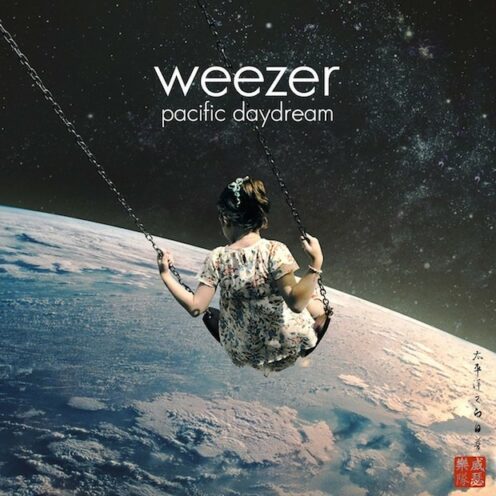
Over the span of nearly 25 years, Weezer have come to be known for a lot of things – frontman Rivers Cuomo’s absurdist lyrics, the goofy Beach Boy persona that seems to contradict his well-documented reclusiveness, a series of self-titled albums known by their respective color palettes – but staying in one place for long has never been one of those things. And so it is unsurprising following the relative critical success of 2014’s Everything Will Be Alright in the End and 2016’s Weezer (White Album) that Pacific Daydream is an inconsistent album by a band whose entire career could be defined by the very same word.
If Pacific Daydream doesn’t sound like the album fans expected, it’s likely because it wasn’t the album the band originally intended to deliver. Fans of Weezer (White Album) rejoiced when Cuomo spoke of a darker, more experimental follow-up, naturally titled Weezer (Black Album). But that same praise seemed to push the band in another direction as he soon began curating a different project. Pacific Daydream is still dark and, at times, experimental, but only in the sense that it occasionally sheds the quirks Weezer have become known for in favor of generic indie-pop largely targeting the same college radio stations inhabited by bands like Twenty One Pilots and Fitz and the Tantrums.
This change in direction is even more predictable considering the band worked with Fitz and the Tantrums on Weezer (White Album)’s weakest track, “Jacked Up,” a drab, falsetto-driven piece of piano-pop that would later be remixed for the album’s deluxe edition. A direct line can be drawn from “Jacked Up” to a number of Pacific Daydream’s biggest missteps, and with relative comparisons in mind, the album is perhaps most reminiscent of Weezer’s largely panned millennial breakout/semi-cult classic, Make Believe.
The first half of the 10-track album, comprised entirely of pre-release singles, is solid enough; opening track “Mexican Fender” and lead single “Feels Like Summer” successfully flaunt a love for huge pop-rock hooks that has persisted Cuomo for the better half of his band’s career. Production on these tracks is clean and compressed thanks in part to executive producer Butch Walker, who furthers the band’s vision by allowing Cuomo’s vocals and deceivingly crunchy guitar work to take center stage (not unlike similar, albeit stronger, rock records released this year by Foo Fighters and The Front Bottoms). Conversely, “Happy Hour” and “Weekend Woman” recall something less guitar-heavy and more experimental, employing heavy percussion and gang vocals as Cuomo continues to challenge Jimmy Buffet’s legacy for all things tropical. But it’s “Beach Boys” – the strangest and most divisive single on the album, during which Cuomo refers to himself as “cooler than the ice capades” and spits lines like “Turn it up, it’s the Beach Boys/Making my eyes get moist” – that best represents what awaits on the album’s B-side.
Songs like “Get Right” and “La Mancho Screwjob” are grown from the worst parts of post-2005 Weezer, constructing grating choruses out of current pop trends (chopped and pitched vocals). It’s the kind of filler Weezer are capable of churning out with mathmatical precision. And again, unsurprisingly, any remaining glimmer of hope for a redemptive closing track is destroyed when Cuomo namedrops Papa John’s within the first 30 seconds of the song, making it even harder to enjoy what already feels like a shiny rehash of last year’s “Endless Bummer.” Fortunately, however, the album’s strongest moments are bundled together, seven minutes of bliss that conveniently separates the good enough from the remarkably bad. “QB Blitz” and “Sweet Mary” could have easily held their own on Weezer (White Album), the former a somber break-up song with a classic Weezer hook and the latter an epic midtempo track that evokes Cuomo’s coveted Beach Boys more successfully than anything else on the record, making proper use of sleigh bells and staggering harmonies. In a perfect world, it would have been the closing track on a much stronger release.
Pacific Daydream is unsurprising for a lot of reasons, but perhaps the biggest is that Pacific Daydream is just as calculated as the binders that line Cuomo’s walls, documenting every painstaking detail behind every song he’s ever written. The band is now 23 years old, and for the last 12 of those years, Cuomo has longed for some kind of breakthrough into the pop world – something more substantial that his co-writing credits with All Time Low and Miranda Cosgrove, something more relevant than “Beverley Hills.” It is ironic that Weezer’s renaissance is ultimately what pushed them to take another half-baked lunge towards mainstream radio, and it’s a genuinely sad realization that Cuomo might never actually understand his band’s strongest asset: their loyal fabase. (After all, it’s only been three years since he claimed that he “forgot that disco sucked.”) But the band’s predictability is also the reason most Weezer fans are content to stick around, regardless of the band’s output. We’ve survived far, far worse than Pacific Daydream, and it’s entirely likely that within the next five years, the band will come back with another album strong enough to keep us guessing as the curious case of Weezer only continues to grow stranger with time.